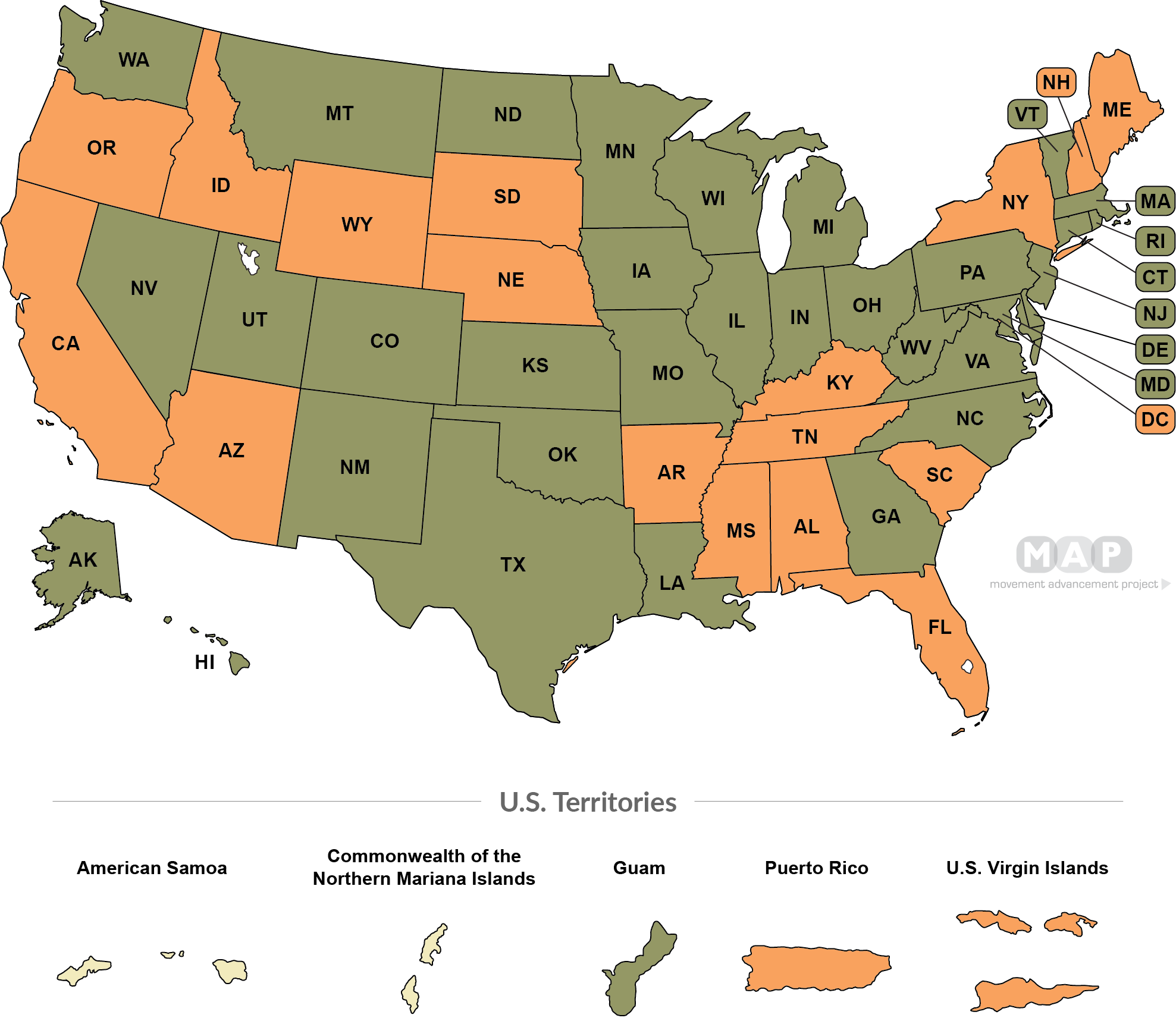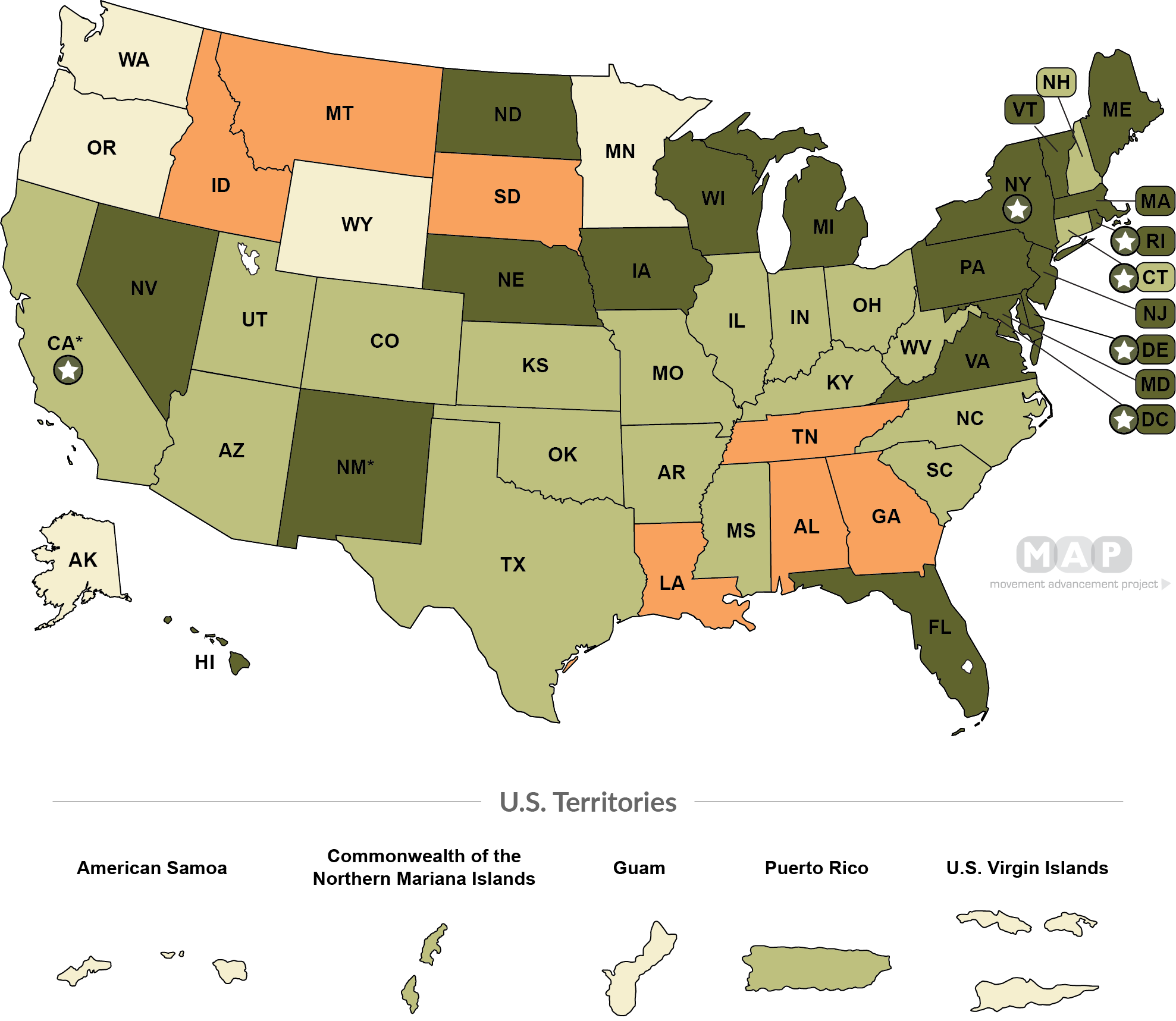
- State includes questions about sexual orientation and gender identity in state-based BRFSS survey of adults (33 states, 1 territory)
- State does not include sexual orientation and gender identity module in its state-based BRFSS survey of adults (17 states , 2 territories + D.C.)
- State does not participate in the BRFSS (0 states, 2 territories)
Recommended citation:
Movement Advancement Project. "Equality Maps: Data Collection." https://www.lgbtmap.org/equality-maps/data_collection. Accessed 11/25/2024.
Percent of Adult LGBTQ Population Covered by Laws
*Note: These percentages reflect estimates of the LGBTQ adult population living in the 50 states and the District of Columbia. Estimates of the LGBTQ adult population in the five inhabited U.S. territories are not available, and so cannot be reflected here. Population estimates are from The Williams Institute.

- State includes questions about sexual orientation and gender identity in state-based YRBSS survey of youth (19 states + D.C.)
- State includes questions about sexual orientation only in state-based YRBSS survey of youth (19 states, 2 territories)
- State does not include questions about sexual orientation or gender identity in state-based YRBSS survey of youth (7 states)
- State does not participate in the YRBSS (5 states, 3 territories)
- State includes question about gender expression in state-based YRBSS survey of youth (5 states + D.C.)
-In 2021, New Mexico asked a transgender status question but using different wording. Because of this different wording, the CDC does not list NM as having asked the transgender status question. We include New Mexico here given our focus on whether states are choosing to collect data about sexual orientation and gender identity in their YRBSS efforts.
-In 2021, California did not have a high enough participation rate to generate reliable data for the whole state, but it still asked the sexual orientation and gender expression questions.
-Some states that do not participate in the YRBSS have their own similar statewide studies of youth, including the Minnesota Student Survey, the Oregon Healthy Teens Survey (2001-2019) / Student Health Survey (since 2020), the Washington Healthy Youth Survey, and the Wyoming Prevention Needs Assessment Survey. While these studies are also important, participating in the YRBSS helps create not only state-level pictures but also a larger national picture and the ability to study the same data and questions across students in all states.
To learn more, visit the YRBSS website.
Recommended citation:
Movement Advancement Project. "Equality Maps: Data Collection." https://www.lgbtmap.org/equality-maps/data_collection. Accessed 11/25/2024.
Percent of LGBTQ Youth Covered by Laws
*Note: These percentages reflect estimates of the LGBTQ youth (ages 13-17) population living in the 50 states and the District of Columbia. Estimates of LGBTQ youth in the U.S. territories or under age 13 are not available, and so cannot be reflected here. Population estimates are from The Williams Institute.
- State has this law Includes Questions
- State does not have this law Does Not Include Questions
| State | Adults | Youth |
| Alabama | State does not have this law | State does not have this law |
| Alaska | State has this law | |
| American Samoa | ||
| Arizona | State does not have this law | State has this law |
| Arkansas | State does not have this law | State has this law |
| California | State does not have this law | State has this law |
| Colorado | State has this law | State has this law |
| Connecticut | State has this law | State has this law |
| Delaware | State has this law | State has this law |
| District of Columbia | State does not have this law | State has this law |
| Florida | State does not have this law | State has this law |
| Georgia | State has this law | State does not have this law |
| Guam | State has this law | |
| Hawaii | State has this law | State has this law |
| Idaho | State does not have this law | State does not have this law |
| Illinois | State has this law | State has this law |
| Indiana | State has this law | State has this law |
| Iowa | State has this law | State has this law |
| Kansas | State has this law | State has this law |
| Kentucky | State does not have this law | State has this law |
| Louisiana | State has this law | State does not have this law |
| Maine | State does not have this law | State has this law |
| Maryland | State has this law | State has this law |
| Massachusetts | State has this law | State has this law |
| Michigan | State has this law | State has this law |
| Minnesota | State has this law | |
| Mississippi | State does not have this law | State has this law |
| Missouri | State has this law | State has this law |
| Montana | State has this law | State does not have this law |
| Nebraska | State does not have this law | State has this law |
| Nevada | State has this law | State has this law |
| New Hampshire | State does not have this law | State has this law |
| New Jersey | State has this law | State has this law |
| New Mexico | State has this law | State has this law |
| New York | State does not have this law | State has this law |
| North Carolina | State has this law | State has this law |
| North Dakota | State has this law | State has this law |
| Northern Mariana Islands | State has this law | |
| Ohio | State has this law | State has this law |
| Oklahoma | State has this law | State has this law |
| Oregon | State does not have this law | |
| Pennsylvania | State has this law | State has this law |
| Puerto Rico | State does not have this law | State has this law |
| Rhode Island | State has this law | State has this law |
| South Carolina | State does not have this law | State has this law |
| South Dakota | State does not have this law | State does not have this law |
| Tennessee | State does not have this law | State does not have this law |
| Texas | State has this law | State has this law |
| U.S. Virgin Islands | State does not have this law | |
| Utah | State has this law | State has this law |
| Vermont | State has this law | State has this law |
| Virginia | State has this law | State has this law |
| Washington | State has this law | |
| West Virginia | State has this law | State has this law |
| Wisconsin | State has this law | State has this law |
| Wyoming | State does not have this law |

